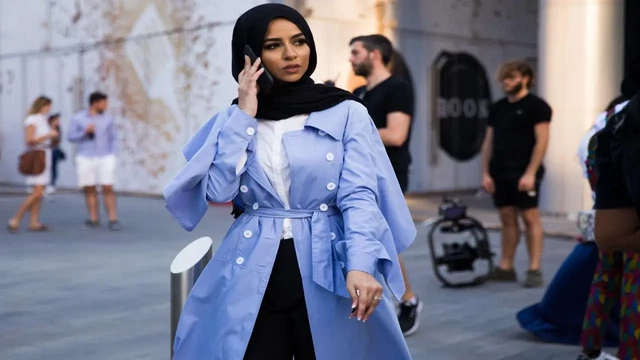Dubai, a city renowned for its skyscrapers, luxurious lifestyle, and exclusive shopping malls, is deeply enriched in cultural and traditional values. While Dubai welcomes millions of tourists annually and appears as a cosmopolitan hub, there stands a specific expectation when it comes to dressing.
Having a keen perception of Dubai dress code is essential before visiting the city. It will help you not only respect the city but also avoid any unnecessary embarrassment or discomfort. Travelers should develop a consciousness of Dubai's dress code before packing for their trip. Although the city offers a more relaxed dress code than other parts of the United Arab Emirates, it aligns with the country's Islamic traditions.
Considering the respect for local cultures and laws, this blog post will explore the Dubai dress code for men, women, and tourists. So, let's delve into some intricate details to learn the essential attire, whether you are strolling the high-end streets of Downtown Dubai area, lounging at the pool at your resort, or visiting the historic places in Old Dubai.
Tourists can show their respect by following the guidelines of the Dubai dress code and making their experience in this fascinating city enjoyable.

Understanding the Dubai Dress Code
The region's conservative cultural norms have largely influenced the dress code in Dubai as they are rooted in Islamic principles. However, the city's dress code rules are more relaxed and tolerant than other Emirates like Sharjah or Abu Dhabi.
Still, it is preferred to dress modestly, specifically in public places such as government buildings, malls, and religious sites. The Government of Dubai has regulated significant points in Dubai's dress code, which is essential to follow by both males and females;
- Nudity is rigorously prohibited.
- The clothes of both men and women should cover their arms, shoulders, and legs,
- Swimwear is only allowed by the pool or beach sides and not in public places.
- Revealing clothes is highly discouraged.
- Clothing that displays offensive slogans or images in public is strictly forbidden.
- A proper dress code is obligatory while visiting the mosque. That includes fully covered clothes for men and abayas or stoles to cover women's heads.
Note: Masjids often keep a considerable stock of these items to ensure the obligation upon every visitor.
Though Dubai offers a family-friendly environment for visitors and locals alike, certain rules will show your respect for local traditions and culture. For example, if you have heard, "While in Rome, Do as Romans do." So, it's better not to go against cultural sensitivities and, while in Dubai, wear what Dubai citizens wear.
The primary consideration is modesty. At a minimum, clothes should cover your shoulders and knees, while revealing or overly tight attire is advised against. Nonetheless, the dress code may slightly differ in accordance with the area and venue.
For instance, at private beaches or resorts, dress codes tend to be lenient and allow you to put on swimwear by the poolside. However, it is critical to be mindful of transitioning from venues to public areas.
Dubai Dress Code for Tourists
When it comes to casual dressing, tourists in Dubai are offered more flexibility compared to formal scenes. Dubai's casual dress code allows tourists to wear t-shirts, jeans, shorts, and sundresses; however, men's shorts are advised to fall below the knee.
Beyond these advisable tips for a casual dress code in Dubai, tourists should also consider the climate and refrain from wearing revealing or extra-tight outfits. Generally, hot weather calls for more airy and light fabrics, whereas when the temperature cools down, carrying a shawl or light jacket is a preferred option.
Dubai's relaxed environment provides slight freedom to tourists compared to other UAE cities; however, abiding by the city's sensitive values is still crucial to respecting particular laws. Below, we will run through a sketch of the dress code for females and males in Dubai.
Dubai Dress Code for Females
Modesty is key when it comes to the dress code for females in Dubai. Women don't need to wear hijabs in Dubai, particularly if they are expats or tourists. However, dressing should align with the city's cultural values and norms. The general guidelines for women's dress code in Dubai are following;
- Modest Clothing: Women are not allowed to wear clothes that reveal parts of the body, are too tight, or are transparent. In public spaces, it is obligatory to wear clothes covering your chest, knees, and shoulders. Wearing shorts, tops, or skirts that do not fall below the knee could be observed as disrespectful and might entice unwanted attention.
- Religious Sites: Women must cover their heads with a scarf while visiting mosques. It is advisable to wear an abaya or a long and loose-fitted dress to cover your entire body. This enforcement is applicable to exhibit your respect towards religious sites.
- Pools and Public Beaches: Women can wear swimwear on beaches when near swimming pools or hotel beaches. Most of the beaches in Dubai also allow bikinis; however, it is better to avoid wearing them on crowded beaches. Moreover, when leaving these areas, women should cover up with a sarong, covered dress, or adequate clothing. It is also a good idea to have a cover-up when not swimming on public beaches.
- Evening and Nightlife Outfits: Dubai's nightlife is as vibrant as the city and allows women to wear fashionable attires when hitting clubs or dining at high-end restaurants. Dress gracefully and elegantly to maintain a good approach, and wearing modest clothing even at such venues is highly considerable. This implies that revealing or extremely short dresses may look inappropriate or raise eyebrows in these spaces.
1. Do You Have to Wear Hijab in Dubai?
One of the primary considerations for female tourists and visitors is whether wearing a hijab is obligatory. The answer is No. There is no compulsion to wear a hijab in Dubai, specifically for women visitors, tourists, or expats.
Women's dressing is typically flexible in Dubai, allowing them to wear any outfit that adheres to modesty guidelines. Nonetheless, the dress code for women slightly differs and imposes compulsions when it comes to religious sites.
For instance, women are required to wear scarves or hijabs when visiting a mosque as a sign of respect for Islamic values. Women visiting Dubai from other countries are free to follow their cultural practices; however, aligning with modesty is a compulsion.
Though the hijab is not compulsory for tourists in Dubai, a number of Muslim women living in Dubai choose to wear one, and that should be respected.

What to Wear in Dubai as a Women: Practical Tips
Planning a trip to Dubai and finding your packing challenging? Let us help you with some practical tips if you are unfamiliar with Dubai's expectations;
- Maxis or Long Skirts: When packing for Dubai, opt for midi skirts, long dresses like maxis, or long and loose trousers. This will add an elegant touch and fit the city's modesty guidelines and climate.
- Loose-Fitted Clothes: Go for loose-fitting and lightweight outfits. Choose a breathable clothing material like linen or cotton to stay cool in Dubai's hot climate and cover your body appropriately.
- Shawls or Cardigans: If you plan to visit more conservative settings in Dubai, a shawl or light cardigan will be a good option. This dress code is preferred in restaurants, malls, or public places because of their high air-conditioning systems.
- Comfortable Footwear: If you want to explore the city tirelessly, it is better to always wear comfortable shoes. Whether you want to roam around the Souks or visit Dubai Mall, wear closed-toe shoes or sandals instead of flip-flops. Formal footwear is preferable at high-end restaurants or events.
Dubai Dress Code for Men
Dubai offers a more relaxed dress code for men compared to women. However, certain restrictions are still observable, and semi-conservative dressing is applied to men.
This imposition does not apply to private places or hotels but indicates respect when visiting government buildings, restaurants, or malls. Men are required to follow key considerations when it comes to a dress code in Dubai;
- Trousers and Shirts: Men should wear a collared shirt, T-shirt, or long trousers. Jeans are more acceptable, and shorts are discouraged in certain public places, specifically in traditional or formal settings. Men can wear shorts at casual places or tourist-heavy zones, but they should also fall below the knee.
- Beachwear: The beachwear for men is similar to that for women in Dubai. Swimwear is allowed on poolside or private hotel beaches. However, appropriate attire is advisable when leaving these zones. Go for more standard swim trunks because overly tight swimwear or speedos are generally discouraged.
- Evening and Nightlife Wear: If you are headed to a club, dining establishment, or bar, opt for a more smart-casual outfit. This includes tailored trousers, blazers, and dress shirts. These establishments often have strict dress codes and do not allow casual footwear or shorts. So, be mindful of dressing in such zones.
Dress Code According to Dubai's Climate
The desert climate of Dubai presents warm winters and hot summers. The summer months, specifically from June to September, tend to be more intense, with temperatures soaring above 40°C. Under such extreme weather, opt for the following tips;
- Breathable Fabrics: Wear breathable fabrics such as silk, cotton, and linen. These fabrics will help you stay cool while following the Dubai dress code.
- Wear Light Colors: Light colors are recommended over dark colors. Light colors reflect the sun's heat rays and prevent unnecessary skin irritations.
Dubai's weather becomes pleasant as the calendar moves forward, bringing the best time for tourists and expats to visit. However, Dubai's evenings in winter can get a bit cooler than days, particularly in desert areas. So, it's better to wear a sweater or jacket according to the intensity of the weather.
How Do People Dress in Dubai
The way people dress in Dubai is characterized by their cultural backgrounds and the areas where they live.
1. Emirati Dress Code
Local citizens, particularly Emiratis, generally prefer traditional attires that represent their cultural heritage. Women often wear abayas (a black cloak covering their clothes), whereas Men wear kanduras (long white robes). These traditional outfits are a sign of cultural pride and reflect the modest values of the UAE.
2. Expats and Tourists Dress Code
The city, however, allows freedom to expats and tourists to maintain flexibility and the freedom to follow their cultural practices, though modesty remains a consistent theme. Tourists are allowed to wear more casual attire in cosmopolitan areas of Dubai, such as Jumeirah Beach or Dubai Marina.
However, in traditional areas near Gold Souk or Deira, you will find people dressed more traditionally. In such conservative settings, following general dress code rules, such as covering the shoulders and knees with covered garments, is advisable.
Dress Dress Code for Special Occasions in Dubai
Dubai is a place where tradition and sophistication blend, and its dress code is the same for all special occasions. Whether you are heading to a wedding, corporate event, or cultural festival, knowing how to dress appropriately is important to fit in and show respect for the event and those around you.
1. Weddings in Dubai
Dubai weddings are extravagant events showcasing the city’s luxury and cultural diversity. Traditions apply to Emirati weddings for both genders, so men and women follow certain outfit norms.
- Women often wear abayas and embellished kaftans. If you’re a guest attending, go for elegant evening gowns that are not sleeveless and are below the knee.
- Men may wear formal suits or traditional kanduras depending on the wedding style.
For non-Emirati weddings, formal Western-style dress is usually appropriate. That said, it is courteous to avoid scandalously revealing clothes and ask whether there’s a dress code mentioned in the invitation.
2. Business and Corporate Events
Dubai’s standing as a business hub draws in professionals worldwide, leading to a place where first impressions count. Dubai business attire is formal and conservative.
- For men, comfortable suits are best, especially in light colors, with matched shoes.
- Women are required to dress in business suits, knee-length dresses, or blouses with skirts that cover their knees.
Meanwhile, the dress code itself is a touch looser for expatriates, but they must still ensure professionalism and decorum of cultural values.
3. Holidays, Festivals and Cultural Celebrations
Other events in Dubai include multicultural or international festivals, such as the Dubai Shopping Festival, Eid celebrations, and the National Day parades. Dressing right for the events improves your experience, showcasing your respect for the culture.
Traditional dress is also often encouraged during religious festivals like Eid. Women can wear ornate, colorful abayas or long gowns, while men can wear Honduras. You can wear casual and comfortable dresses in modern festivals, but make sure you maintain modesty. Even if the atmosphere is festive, do not wear anything too informal, such as tank tops or shorts.
4. Nightlife Events and Concerts
Dubai has a vibrant nightlife scene, and many upscale venues have dress codes. Smart-casual attire is preferable, such as
- Chinos and button-down shirts for men
- Elegant dresses, smart trousers and fashionable tops for women.
Nonetheless, bear in mind that even in nightlife venues, Dubai’s cultural values dictate tasteful and conservative dressing.
5. Real Life Advice for Special Occasions
- You should always refer to the dress code if there’s one on an event invitation.
- Choose loose, breathable fabrics and layers to accommodate temperature shifts between indoor air-conditioned venues and outdoor heat.
- Modestly accessorized, bold jewellery or a nifty bag can take your outfit to the next level without being disrespectful.
- By dressing appropriately for special occasions in Dubai, you’ll fit right in and enjoy the occasion more while respecting the culture and traditions of the city.
What Clothes Are Not Allowed in Dubai?
Dubai is a city of modernity and multiculturalism; however, it adheres to the cultural norms based on the local traditions. Although no official law governs tourists' dress code, some dress codes are not considered suitable at the place of convergence.
Ever come this question in mind that can you wear shorts in Dubai? It is not recommended to wear revealing outfits. Skirts that are too short, see-through material, low-cut tops, and clothes that expose the midriff can result in unwanted attention, particularly at the malls, marketplaces, and government offices.
Wearing clothes with offensive writing, explicit pictures, or disrespectful signs is prohibited. This entails slogans that foster violence, political, or material that opposes the local values. Beachwear is only applicable in private beaches, hotel pools, and resorts. It is impolite to wear bikinis, swim shorts, or topless suits outside these places, as one can be warned or fined.
Stricter modesty is required in religious places and events. Sleeveless tops, tight clothes, and shorts that are too short should not be used. Shoulders and knees are recommended to be covered by both men and women. It is through these unwritten rules that visitors can also visit Dubai without any issues and remain within the conventions of the local culture and societal norms.
Closing In
Dubai beautifully blends tradition with modernity and allows for a more lenient dress code than other cities of the UAE. Besides a relaxed environment, respecting local customs is crucial for anyone visiting Dubai. Abiding by the general rule of modesty while considering the dress code in Dubai will prevent one from getting unnecessary attention or experiencing uncomfortable situations.
Whether you are relaxing by the beach, strolling through the traditional Souks, or exploring magnificent malls, modest dressing is the best way to ensure a respectful and hassle-free experience in Dubai. For both women and men, the key takeaway is to harmoniously balance modesty and comfort. So, pack your bags with elegant, graceful, and modest attire and relish the worldly opportunities offered by the city.
Dubai dress code may seem strict to some people, yet it is a simple reflection of the city's religious beliefs and cultural values. However, it is not as strict as it seems, and tourists can explicitly find that in the guidelines mentioned above.
Dressing adequately is a symbol of respect for the city, whether you're visiting Dubai for leisure, business, or cultural experience purposes. The vibrant and grand city ensures a respectful and comfortable stay for everyone, making your trip unforgettable for certain reasons.
Explore More About Dubai






